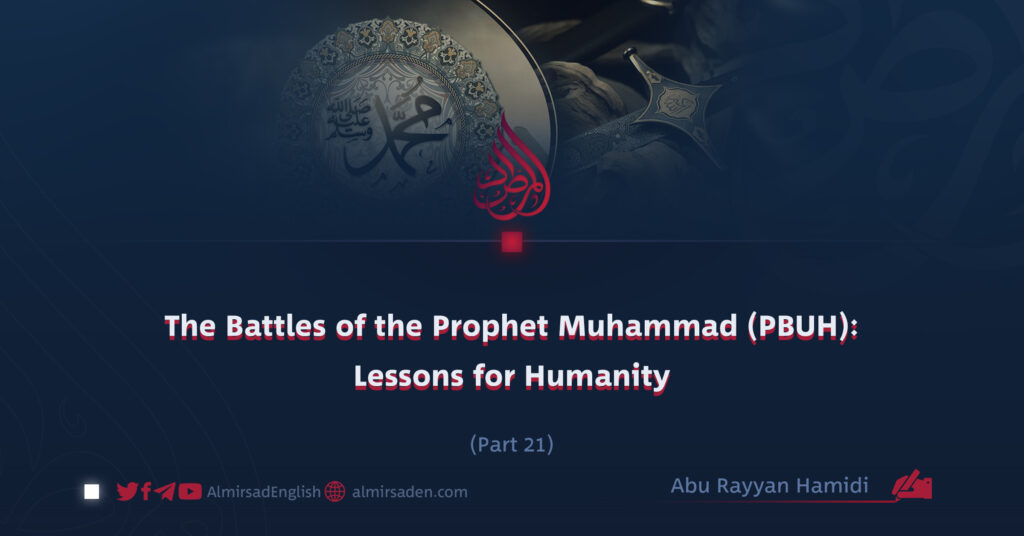Part 21
By Abu Rayyan Hamidi
The Impact of the Battle of Badr on the Arabian Peninsula
The Battle of Badr ended with a decisive and unprecedented triumph for the Muslims, a victory that reverberated across the Arabian Peninsula and shook its political and military foundations. The Arabs were astonished, while the Jews and the hypocrites were alarmed, for the rise of a force capable of checking their intrigues and ambitions unsettled them deeply. Their resentment was shared by many others, and from that moment onward, the enemies of Islam began to coordinate, pledging to unite in order to block the Muslims from securing further success.
Though bound together by their hostility, each adversary pursued a distinct strategy. United in opposition yet divided in method, they all sought to arrest the growth of Islam. The following is a brief overview of their different responses to the outcome of Badr:
1. Makkah after the Defeat
Makkah was plunged into grief. Many of its leading figures had fallen in battle, but the Quraysh, unwilling to reveal weakness, forbade public mourning. Beneath this enforced silence, however, the fire of vengeance smoldered ever hotter. Their enmity toward Islam only hardened, and their resolve to retaliate grew firmer.
The Quraysh began rebuilding their strength, marshalling troops, and forging alliances with neighboring tribes. These efforts would eventually lead to the Battle of Uhud, which will be discussed in detail later, Allah willing.
Meanwhile, the Muslims still residing in Makkah suffered greatly. Those who concealed their faith lived in constant fear, while those who declared it openly were subjected to relentless persecution and torture.
2. Madinah after the Victory
In contrast, the situation in Madinah was one of consolidation and growth. The Islamic state emerged stronger and more secure. Those who had resisted Islam now professed faith outwardly, though many did so insincerely. These were the hypocrites, led by Abd-Allah ibn Ubayy ibn Salul.
Realizing that Islam’s power had become undeniable, he urged his followers to adopt the outward forms of belief, claiming that no alternative remained. They proclaimed Islam with their tongues while concealing enmity in their hearts. From the shadows they conspired, weaving plots against the Messenger of Allah (PBUH) and the Muslim community.
3. The Jews after the Battle
When the Prophet (PBUH) migrated to Madinah, a treaty had been drawn up between the Muslims and the Jewish tribes. Both sides pledged to maintain peace and not to aid one another’s enemies. The Muslims, though ascendant, honored the agreement with complete fidelity, adhering to the Prophet’s (PBUH) command to remain true to covenants.
The Jews, however, soon betrayed this trust. Their concealed hostility flared openly after Badr. Under the leadership of Ka’b ibn al-Ashraf, they began stirring the Quraysh of Makkah and other polytheists to war. When their plots came to light, tensions escalated sharply, leading to the successive conflicts with Banu Qaynuqa’, Banu Nadir, and Banu Qurayza. In the end, Madinah was cleansed of their treachery. The details of these episodes will be discussed in their proper place, Allah willing.
4. The Bedouins after the Battle
The nomadic tribes surrounding Madinah were likewise unsettled by the Muslims’ victory. The consolidation of the Islamic state curtailed their age-old practices of raiding and plundering, livelihoods on which many of them had long depended.
Their discontent, however, was of a different kind from that of the Quraysh. The Quraysh resented Islam for political and religious reasons, while the Bedouins cared little for matters of faith. What angered them was simply that their lawless way of life was being restrained by the growing authority of Islam.
